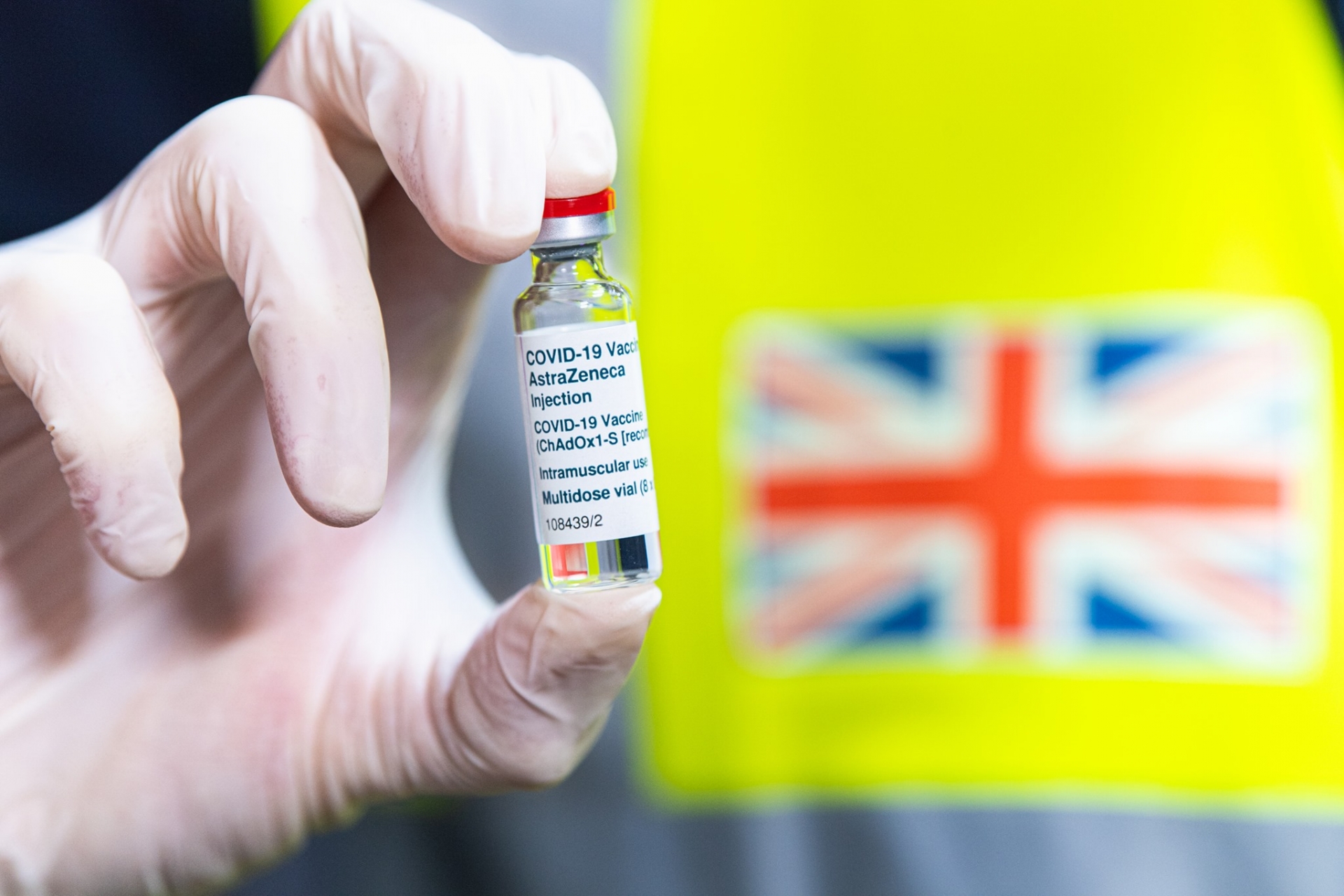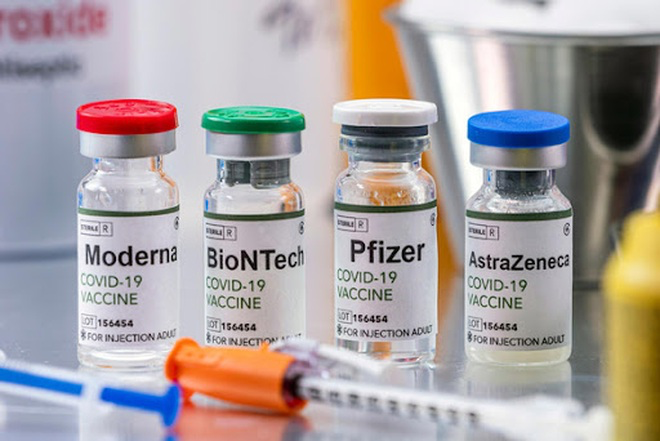Novel coronavirus: what do we know so far?
(Video: The Guardian)
As the world further shuts down in the wake of the coronavirus pandemic, more cases are now being recorded outside of China, where the virus was first detected in the central city of Wuhan, than outside.
As of March 27, nearly 24,000 people worldwide have died of COVID-19, the disease caused by the coronavirus. More than 528,000 people have tested positive for COVID-19.
What is coronavirus?
According to the WHO, coronaviruses are a family of viruses that cause illnesses ranging from the common cold to more severe diseases such as severe acute respiratory syndrome (SARS) and the Middle East respiratory syndrome (MERS).
These viruses were originally transmitted from animals to people. SARS, for instance, was transmitted from civet cats to humans while MERS moved to humans from a type of camel.
Several known coronaviruses are circulating in animals that have not yet infected humans.
The name coronavirus comes from the Latin word corona, meaning crown or halo. Under an electron microscope, the looks like it is surrounded by a solar corona.
The novel coronavirus, identified by Chinese authorities on January 7 and since named SARS-CoV-2, is a new strain that had not been previously identified in humans. Little is known about it, although human-to-human transmission has been confirmed.
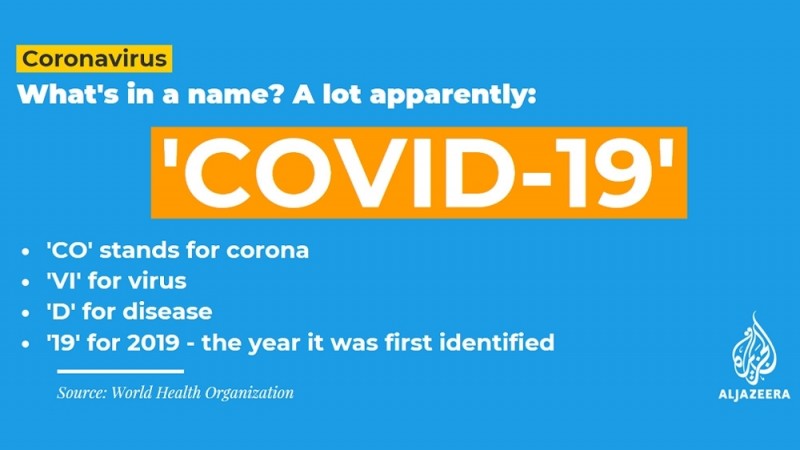 |
| What does "COVID-19" means? (Photo: Aljazeera) |
How deadly is it?
With more than 24,000 recorded deaths, the number of fatalities from this new coronavirus has surpassed the toll of the 2002-2003 SARS outbreak, which also originated in China.
SARS killed about 9 percent of those it infected - nearly 800 people worldwide and more than 300 in China alone. MERS, which did not spread as widely, was more deadly, killing one-third of those infected.
While the new coronavirus is more widespread than SARS in terms of case numbers, the mortality rate remains considerably lower at approximately 3.4 percent, according to the WHO.
Where have cases been reported?
Since March 16, more cases were registered outside mainland China than inside, marking a new milestone in the spread of the global pandemic.
The virus has spread from China all around the world, prompting the WHO to designate the COVID-19 outbreak as a pandemic.
Human-to-human transmissions became evident after cases were recorded with no apparent link to China.
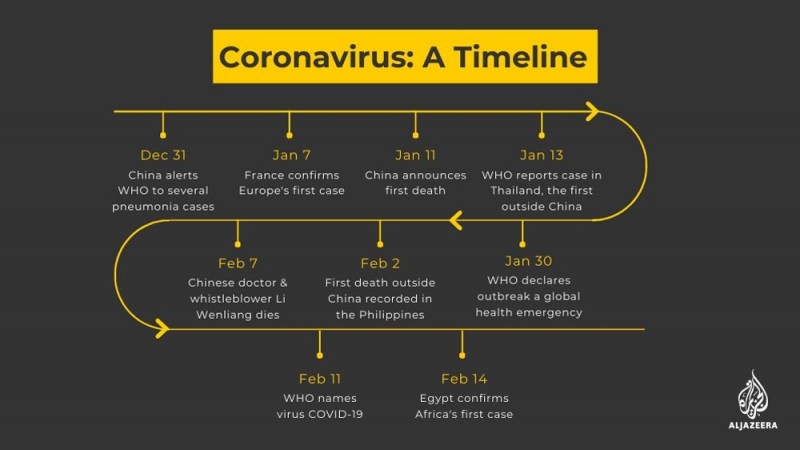 |
| (Photo: Aljazeera) |
What are the symptoms this coronavirus causes?
According to the WHO, the most common symptoms of Covid-19 are fever, tiredness and a dry cough. Some patients may also have a runny nose, sore throat, nasal congestion and aches and pains or diarrhoea. Some people report losing their sense of taste and/or smell. About 80% of people who get Covid-19 experience a mild case – about as serious as a regular cold – and recover without needing any special treatment.
About one in six people, the WHO says, become seriously ill. The elderly and people with underlying medical problems like high blood pressure, heart problems or diabetes, or chronic respiratory conditions, are at a greater risk of serious illness from Covid-19.
As this is viral pneumonia, antibiotics are of no use. The antiviral drugs we have against flu will not work, and there is currently no vaccine. Recovery depends on the strength of the immune system.
What should I do if I develop symptoms?
If you think you have been exposed and develop symptoms, call your doctor. Ask if you can be tested. He or she will likely test you first for other respiratory infections such as the flu.
Isolate yourself from others and limit contact with pets as well. Cover your mouth and nose with a tissue when you cough and sneeze. Follow the same precautions you would to prevent infection, washing hands regularly. Wear a face mask, if you have one, when around others at home.
Who is most at risk?
Adults of all ages have been infected, but the risk of severe disease and death is highest for older people and those with other health conditions such as heart disease, chronic lung disease, cancer and diabetes. Most of the 1,023 people whose deaths were included in a study by the Chinese Center for Disease Control and Prevention were age 60 or older, and/or had other illnesses. Many patients who have died were admitted to hospitals when their illness was advanced. One large study in China found a mortality rate of 14.8% in people ages 80 and older, and 8% in people ages 70 to 79, compared with a 2.3% mortality rate overall in the population studied.
Are smokers more likely to be at risk from coronavirus?
Smoking can make people more susceptible to serious complications from a coronavirus infection, the European Union agency for disease control said.
In its updated assessment of the risks caused by the coronavirus, the European Centre for Disease Control and Prevention (ECDC) included smokers among those potentially most vulnerable to COVID-19.
Smokers have also appeared to be more susceptible to breathing complications caused by the disease, and the ECDC said it was advisable to identify them as a potential vulnerable group, confirming an earlier assessment.
The agency cited a study by Chinese doctors which on a sample of 99 patients affected by the coronavirus found that acute smokers were more at risk of dying than elderly people.
The ECDC report also said smoking was associated with heightened activity in the lungs of an enzyme, ACE2, that could make patients more vulnerable to COVID-19, citing a study conducted by Guoshuai Cai, from the University of South Carolina.
The activity of ACE2, or angiotensin converting enzyme 2, also increases with age and with some kinds of hypertension treatment - both risk factors - the ECDC said.
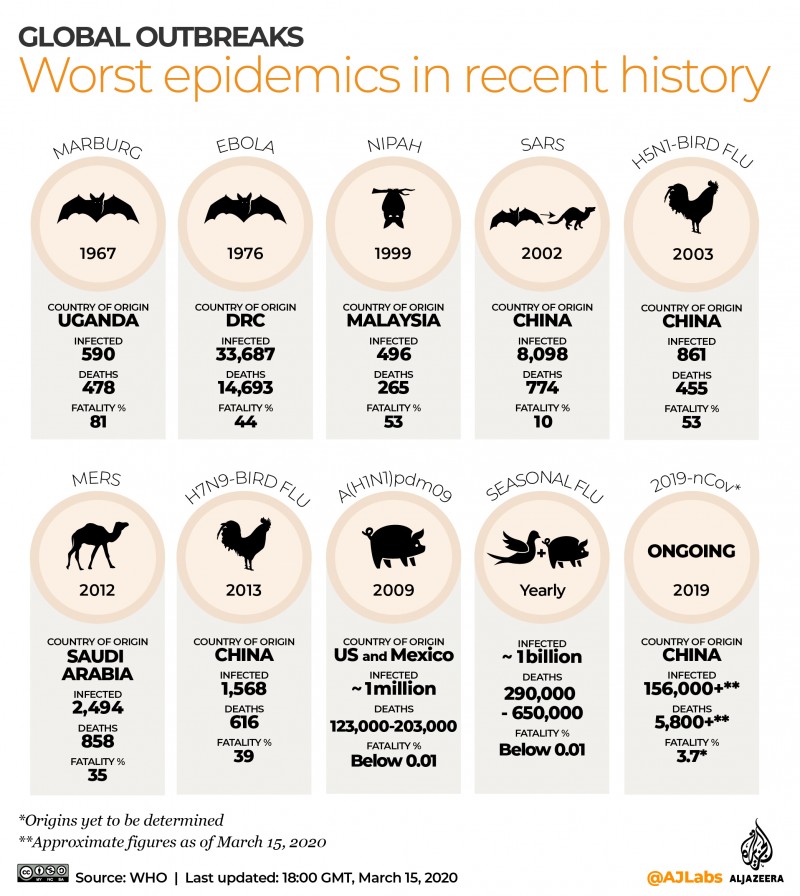 |
| (Photo courtesy of WHO) |
How is the virus spread among humans?
It transmits through “respiratory droplets” when an infected person speaks, coughs or sneezes, according to the WHO. The droplets spread through the air and can land on another person’s mouth or nose, or possibly be inhaled into their lungs, infecting them. The droplets can also settle on nearby surfaces like a desk, counter or doorknob, where they can survive for a period. A person can become infected by touching a contaminated surface, then touching their mouth, nose or eyes.
Respiratory droplets are heavy and don’t travel far in the air, so transmission is believed to occur mostly through close contact, meaning within 6 feet of an infected person.
Scientists are also investigating whether the new coronavirus might spread through urine or feces. Tests have found it in the digestive tract of some patients.
How long can the virus survive on surfaces?
It can last up to 72 hours on plastic and stainless steel, up to 24 hours on cardboard and four hours on copper, according to a study in the New England Journal of Medicine by U.S. government and academic scientists. But it degrades quickly, said Vincent Munster, a virologist with the National Institute of Allergy and Infectious Diseases who led the research.
The study also showed that the virus can survive in small droplets, known as aerosols, for about three hours, though it disintegrates over time. These droplets are small enough to remain suspended in the air for half an hour to an hour, depending on air flow, Dr. Munster said.
Wipe down countertops, doorknobs and other commonly touched surfaces frequently. Regular household disinfectant wipes and cleaners kill the virus.
What else can I do to protect myself?
The most important thing you can do is wash your hands frequently, for at least 20 seconds each time. Wash them regularly when you are at the office, when you come home, before you eat and other times that you are touching surfaces. You can also use a hand sanitizer that contains at least 60% alcohol. Don’t touch your eyes, nose or mouth—viruses can enter your body that way. Wipe down objects and surfaces frequently with household cleaner, which will kill the virus. Maintain a distance from people who are sick. Stay about 6 feet or more away from others.
Stock up on some supplies when recommended to stay home, infectious-disease experts say. Items to consider include shelf-stable foods like cans of beans, packages of rice and pasta, and beverages; pain relievers and other common medications; extra prescription medications; and hygiene and cleaning products.
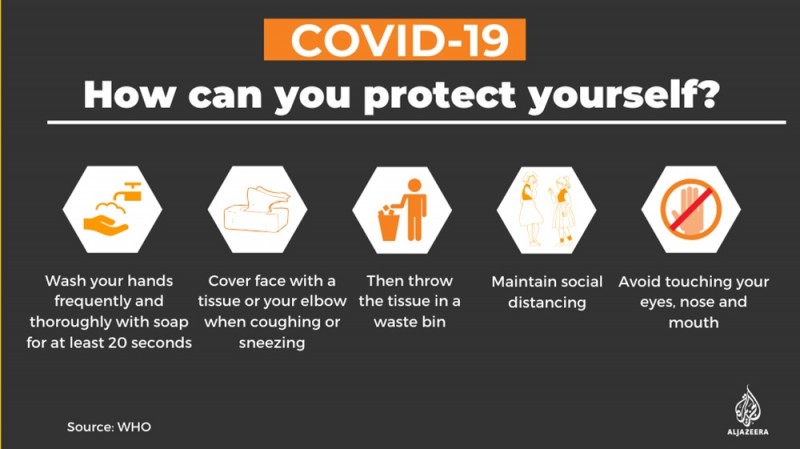 |
| (Photo courtesy of WHO) |
What is being done to stop it from spreading?
Scientists around the globe are racing to develop a vaccine but have warned it is not likely one will be available for mass distribution before 2021.
Meanwhile, Chinese authorities have effectively sealed off Wuhan and placed restrictions on travel to and from several other cities, affecting some 60 million people. Other countries have since followed suit with total lockdowns, closing schools, restaurants, bars, and sports clubs, and also issuing mandatory work-from-home decrees.
International airlines have cancelled flights the world over. Some countries have banned non-citizens from entering their territories, and several more have evacuated their citizens from abroad.
Is this a global emergency?
Yes, this outbreak is a global health emergency, the WHO said on January 30, raising the alarm further on March 11 when it declared the crisis a pandemic.
The international health alert is a call to countries around the world to coordinate their response under the guidance of the WHO.
There have been five global health emergencies since 2005 when the declaration was formalised: swine flu in 2009, polio in 2014, Ebola in 2014, Zika in 2016 and Ebola again in 2019.
In topics
Recommended
 World
World
Seminar Marking 50th Anniversary of Treaty of Amity and Cooperation in Southeast Asia
India has strengthened its position after the AI Impact Summit in Delhi
 World
World
High-Level Segment of 61st Session of the UN Human Rights Council Opens in Geneva
 World
World
US Media Commend Vietnam’s Role in Global Peace Efforts
Popular article
 World
World
Vietnam Officially Becomes Association Country of International Energy Agency (IEA)
 World
World
Key pacts signed as PM Modi hosts France's Macron for plane cooperation
 World
World
India, Canada commit to strengthening bilateral ties, discuss trade
 World
World










